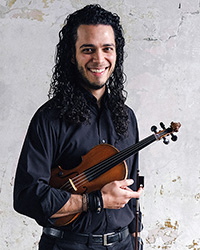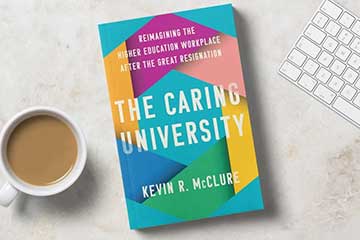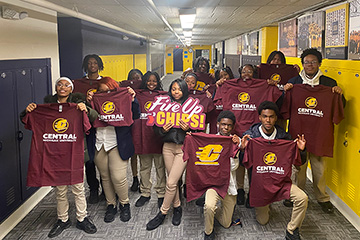What role does music have in video games?
Experts discuss what makes for great game music
Highlights:
- Music is an important element to make video games feel more immersive.
- Video games draw music from across genres.
- Music is so engrained in gaming that some games are known primarily for it.
Video games are a big part of how we entertain ourselves. They’re also growing in social acceptance. Part of the gaming experience is the soundtrack and music is a big part of that.
Marco Schirripa and Matheus Garcia Souza are members of Central Michigan University’s School of Music faculty. They also know how music plays an important role in a game’s experience.
Q. What makes great video game music?

Marco: One beautiful thing about art is that we all can enjoy and be impacted by vastly different things for different reasons. For me, it can be as simple as that the music grooves really hard or is musically sophisticated in an interesting way. When I played the game Shovel Knight for the first time, I died a lot, to the point where I would normally get frustrated and possibly even give up. Each level has such an incredible soundtrack however, to that each death just meant I got to jam out to the music again. When I look back on my fond memories of that game, I have forgotten so much about the gameplay and story, but I can sing every tune.
There are also the tracks which on their own may not be as memorable, but in the context of the scene or environment work perfectly. This tends to be common in online RPGs, a genre of which I am very fond. When I played Phantasy Star Online or Final Fantasy XIV, I loved the music and would always feel so immersed in a world that was existing parallel to our own. However, that same feeling isn’t there when you extract the music. If you play me the music from the “cave” or “forest” area, I might not even recognize where it is from, but in the context of the game it is irreplaceable. Entering the city of New Gridania in FFXIV just isn’t the same without the French horn and string introduction.

Matheus: That's a fantastic question, and one that delves into the heart of what makes games so immersive. It's a topic I find incredibly engaging, and one which we explore in depth in the course, "Video Game Music: From Pong to the Future."
While there's always an element of personal taste, some key factors consistently contribute to truly great video game music:
Synergy with Other Game Elements: Music that works hand-in-hand with the visuals, sound effects, story and gameplay. When all these components align, the music elevates the entire experience.
Technical Quality: This includes strong composition and thoughtful instrumentation, as well as excellent mixing and sound design. High production values ensure the music is impactful and well-integrated.
Memorable Melodies: Great game music often features tunes that are not only catchy but also creative enough to remain engaging even with repetition, which is crucial given how often video game music loops.
Emotional Resonance: Effective music establishes moods, evokes feelings and helps draw players deeper into the game's world, whether it's building excitement, tension or wonder.
Q. What genre of music is best associated with video game music?
Marco: I think this is a tough question to answer because soundtracks to movies and video games take influence from all sorts of genres and calls to question what even makes something classical or EDM. Many RPGs I enjoy employ full orchestral scores, which might make one label it as classical, but I have never heard a Mozart symphony that sounds like that. A niche game I enjoy, The Last Remnant, has an eclectic mix of orchestral and prog rock influences, often within the same tracks, where a loud rock band begins playing over the orchestra.
I think soundtracks have evolved beyond the electronic niche they were known for in the 80s and 90s, limited by a console’s hardware capabilities. Modern tech allows us to have anything from acoustic rock to full orchestra to electronic music to ambient sounds sampled from nature. The artistic range of games spans so wide, I don’t think you can really pin down one genre.
Matheus: I would be more inclined to call video game music its own genre. Just like Marco mentioned movie soundtracks, video game music can take all sorts of shapes and roles. While you can imagine a film with a mostly rock soundtrack, or orchestral, or atmospheric, you can just as easily imagine games with that sort of variety in their soundtracks. Some games, like the Tony Hawk's Pro Skater series, make heavy use of already-recorded pieces of music by different artists for their soundtrack.
Q. How is the music related to the game’s soundtrack?
Marco: For a gameplay-focused game like a shooter, sports or platformer, I think the music’s job is to complement the activity. If the music is loud and unpleasant, it could ruin the experience (or cause you to play with the sound muted), but mainly it just provides something appropriate in the background.
With a longer-form game like an adventure or RPG, the music tends to play a bigger role because of how many different environments you visit, how much time you spend and because of its role in the overall worldbuilding. If you are travelling through a sprawling plain toward a Medieval castle, a pastorale orchestral piece might sound great, while dubstep might sound out of place.
Then there are rhythm games like Dance Dance Revolution, where the music IS the game. In this case, it’s pretty self-explanatory, but DDR was a huge part of my life growing up, both for my love of games and love of music, so it is definitely worth mentioning.
Matheus: What Marco said! In an adventure or RPG game, the music can also provide clues as to what is happening or will happen next. Typically, the music IS the soundtrack. However, it is rather common nowadays for composers to slightly modify their music written for a specific game when releasing the soundtrack album for that game to better fit the aesthetic of a music album.
Q. How big a part of the video game industry is the music?
Marco: I can’t speak about this from a business perspective, but every game needs someone to design the sound. You don’t think about it, but the slot machines you play at a casino have composers who wrote the music. Someone had to write the jingle that random claw machine plays when you put in your money.
Matheus: Music can sometimes make or break a video game. Artistically speaking (including my biases), music plays an enormous role in the video game industry. Financially speaking, at least as of now, it does not represent as big a part as music in the film or TV industry. This is one of the points we discussed with our most recent guest speaker for the Video Game Music class, composer for Star Wars Outlaws, Mortal Kombat 11, Helldivers II, etc. There are compensation laws that apply to music for moving image, which include music for films, ads, tv, etc. Many of these, however, do not apply for video games. Roughly, what this means is that video game music composers and recording artists are not entitled to royalties for their music inside a video game. At the same time, if a video game designer decides to use a track by The Beatles, for example, they will have to consider a sizable licensing fee.
Q. Are there video games known primarily for their music?
Marco: There are, of course, rhythm and music games where the music is pretty much the entire point, like Dance Dance Revolution, Pump It Up, Guitar Hero, Beatmania, etc. Aside from those, I think the general public tends to remember music most fondly from games they enjoyed or played a lot growing up, not necessarily because the music itself stands out.
That being said, I think there are a few games where the sound is noteworthy for different reasons. We have games like Super Mario Brothers and Undertale, where the themes have become almost a static part of culture even outside gaming. Who doesn’t know the Mario theme?
More niche, but also games like Crazy Bus, where the music is completely unhinged to a meme-worthy level.
There are a few games which were not received as well critically but have music that has made a lasting impact on players, such as the original Nier, or Paper Mario: The Origami King, the latter of which was the subject of a 40-minute-long virtual concert of arrangements for the vgmtogether convention in 2021. This collaboration is actually how my colleague, CMU violin professor Matheus Garcia Souza, and I first met.
Then, of course, we have games like Journey, which received legitimate mainstream recognition. Austin Wintory’s score to Journey was the first game soundtrack to ever receive a Grammy nomination for “Best Score Soundtrack for Visual Media.”
Matheus: All that Marco said. The recently created Grammy category for “Best Score Soundtrack for Video Games and Other Interactive Media” is a good example of how this artform is becoming increasingly recognized in the last 3 years. Much like other industries and areas, the video game music community is extensive, and it is typical that, when entering this industry, one will get to know games through their outstanding music. This would be an instance where games become known primarily for their music. A great example that comes to mind would be the music from Chrono Trigger. Despite being not nearly as popular as the Mario franchise, for example, several themes from Chrono Trigger are instantly recognized by video game music fans and industry professionals.
About Marco Schirripa and Matheus Garcia Souza
Marco Schirripa is a percussion faculty in Central Michigan University’s School of Music. He earned his Bachelor of Music from Ithaca College and his master’s and doctorate from Indiana University.
He performed at the North American Conference on Video Game Music. His current project, Pixel Masterworks, has commissioned new concert works for marimba by 7 video game composers. The world premiere performances will take place at CMU on November 19, with a studio album to release next year.
Matheus Souza is a violin faculty in Central Michigan University’s School of Music. He earned his Bachelor of Music from the University of Missouri, his master’s from Yale University, and his doctorate from SUNY Stony Brook.
He performed (with Marco!) at the North American Conference on Video Game Music as well as the Music and Gaming Festival (MAGFest) and is planning to return to MAGFest in January with his group Videri String Quartet for more performances and panels.




